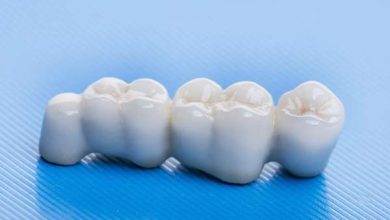Dental Bridge Vs Implant: Making the Right Choice for Stronger Teeth

Dental bridge vs implants both are two options used to replace missing teeth. Bridges are artificial teeth that are held in place by surrounding teeth, while implants are metal posts implanted into the jawbone to support artificial teeth.
Dental bridges and dental implants serve the same purpose of replacing missing teeth, but they differ in how they are secured in the mouth. Bridges rely on neighboring teeth for support, while implants are anchored directly into the jawbone. Both options have their advantages and disadvantages, focusing on factors like durability, cost, and procedure complexity.
It is essential to consult with a dental professional to determine which option is best suited for your specific dental needs. Overall, the choice between a dental bridge and a dental implant depends on various factors, such as the number of missing teeth, the health of the surrounding teeth and gums, budget, and personal preference.
Understanding Dental Bridges
Dental bridges are a popular solution for replacing missing teeth. These fixed prosthetic devices consist of one or more artificial teeth, known as pontics, which are held in place by adjacent natural teeth or dental implants. Dental bridges are designed to restore both the appearance and function of a patient’s smile.
There are several types of dental bridges available, including traditional bridges, cantilever bridges, and Maryland bridges. Each type has its own set of advantages and disadvantages that should be considered when determining the best option for a patient’s specific needs.
Traditional bridges offer a strong and durable solution, while cantilever bridges are ideal for areas with only one adjacent tooth. Maryland bridges, on the other hand, are a more conservative option that requires minimal alteration to the natural teeth. It is important to consult with a dentist to determine which type of dental bridge is most suitable for each individual case.
Exploring Dental Implants
Dental implants are a popular solution for replacing missing teeth. These titanium fixtures are surgically placed into the jawbone to serve as artificial tooth roots. They provide a stable foundation for dental crowns, bridges, or dentures. There are different types of dental implants, including endosteal and subperiosteal implants.
Endosteal implants are placed directly into the jawbone, while subperiosteal implants sit on top of the jawbone but beneath the gum tissue. Dental implants offer numerous advantages, such as improved appearance, enhanced speech, and increased comfort compared to dental bridges.
However, they do have some downsides, including the need for surgery, longer treatment time, and higher cost. It’s important to consult with a dentist to determine if dental implants are the best option for you.
Factors To Consider When Choosing
Factors to consider when choosing between a dental bridge and implant are cost comparison, durability and longevity, oral health requirements, and aesthetic considerations. Bridges are generally less expensive than implants but may require replacement over time. Implants, on the other hand, tend to be more durable and last longer.
Oral health requirements for bridges include having healthy adjacent teeth to support the bridge, while implants require a healthy jawbone for successful placement. Aesthetic considerations involve how natural and seamless the restoration will look in your mouth. Ultimately, your dentist can help determine the best option for you based on your specific needs and budget.

Credit: benchmarkdentalcare.com
Making An Informed Decision
Choosing between a dental bridge and an implant requires careful consideration of individual needs and conditions. A consultation with a dental professional is essential to make an informed decision. By evaluating long-term goals and budgets, one can determine the best option.
Whether a dental bridge or implant is the right choice depends on factors such as the number of missing teeth, jawbone health, and personal preference. A dental bridge involves the placement of crowns on adjacent teeth to support a false tooth, while a dental implant involves the insertion of a titanium post into the jawbone to support a prosthetic tooth.
Each option has its advantages and disadvantages, and a dental professional can provide guidance based on an individual’s unique situation. Ultimately, the goal is to restore the smile, improve functionality, and maintain good oral health.
Frequently Asked Questions On Dental Bridge vs. Implant
What Is Better A Bridge Or Implant?
A bridge is a good choice for replacing a missing tooth. Implants are also a great option.
Why Is A Doctor Prefer Bridge Over Implant?
A doctor may prefer a bridge over an implant due to various factors like cost, bone condition, and oral health.
What Is More Painful A Bridge Or Implant?
A bridge and an implant can both cause pain, but the level of pain varies depending on the individual.
What Are The Disadvantages Of Dental Bridges?
Dental bridges have some drawbacks. They can cause sensitivity, require special cleaning, and may damage adjacent teeth.
Conclusion
When deciding between a dental bridge and an implant, it is important to consider several factors. The dental bridge offers a quick and affordable solution for replacing missing teeth, allowing for improved aesthetics and function. However, it does require the support of adjacent teeth and may need replacement over time.
On the other hand, dental implants provide a long-term solution that preserves neighboring teeth, offers enhanced stability, and promotes jawbone health. Although the dental implant procedure is more involved and costly, it provides a more natural look and feel. Ultimately, the choice between a dental bridge and an implant should be based on an individual’s specific needs and preferences, as well as the guidance of their dental professional.
Whether you decide on a dental bridge or implant, restoring your smile will not only boost your confidence but also improve your overall oral health.




2 Comments